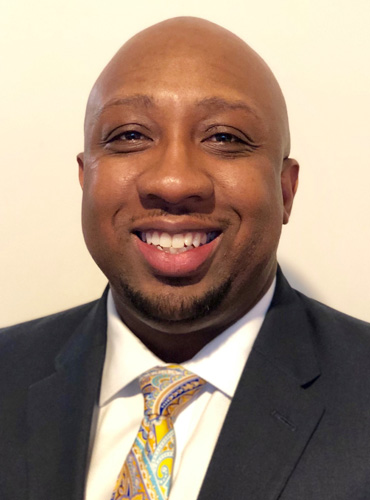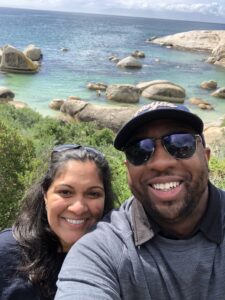
In Marcus Butler’s opinion, a great project manager possesses a combination of technical and soft skills. He believes that the dual approach of having the knowledge of project management methodologies, tools, and techniques, along with communication, leadership, and problem-solving skills, are vital to leading teams and projects forward.
“A great project manager should be able to lead and motivate the team to achieve project objectives, while also being approachable and empathetic towards team members’ concerns,” he says.
Professor Butler’s early experience in the U.S. Air Force instilled skills that would lead him to become a project manager in both public and private sectors. As the current Director of Logistics for the Electronic Health Record Modernization Integration Office (EHRM IO), Marcus Butler is responsible for program oversight and executive leadership in the areas of transportation management, facilities management, equipment management, analytical reporting, and logistics operations.
In addition to his 20-year career in project management, Professor Butler is committed to the betterment of minority youth and young adults. He founded the Guiding Youth For Tomorrow (GYFT) (pronounced Gift) Foundation, an organization that empowers and uplifts its target group by focusing on their mental, social, physical and financial well-being to help them identify their natural gifts.
Professor Butler holds a BS in aeronautical industrial technology from Tennessee State University and an MPS in project management from Georgetown University.
Below, Butler shares his predictions for the future of the project management field, what he enjoys most about teaching at Bovard College, and how he’s impacting the youth through his nonprofit organization.
How did you get your start in project management?
My journey into project management began in 2003 when I started my career in the United States Air Force as an engineer. In this role, I was responsible for planning, organizing, and executing all the activities associated with acquisition management. I developed and implemented program management techniques and internal controls to manage acquisition programs and their support functions. My responsibilities also included determining organizational structures, personnel, training requirements, and security needs, as well as establishing performance standards, work schedules, and project priorities. I coordinated and executed acquisitions to support daily operations, contingencies, and warfighting capabilities.
Additionally, I directed all activities within the acquisition life-cycle, from the conceptual phases to the validation phase, engineering/manufacturing phase, production phase, and deployment phases. Managing the cost, schedule, performance, and supportability of my assigned acquisition programs was a crucial aspect of my role.
From your perspective, in what ways does being a U.S. Air Force veteran align with the skills you’ve acquired as a project manager?
Throughout my military service, I held various leadership positions where I was responsible for managing personnel and resources while maintaining operational readiness. This experience helped me hone my project management skills by providing me with a solid foundation in planning, coordinating, and executing complex operations.
In addition to leadership, I acquired valuable problem-solving skills. The unpredictable nature of military operations often required me to adapt quickly to changing circumstances and find innovative solutions to complex problems. As a project manager, I apply these same problem-solving skills to anticipate and overcome obstacles, mitigate risks, and ensure that projects are completed on time, within budget, and to the satisfaction of stakeholders.
Finally, my experience in the military taught me the importance of teamwork and collaboration. In the Air Force, I worked alongside individuals from diverse backgrounds and skill sets to achieve our shared goals. As a project manager, I recognize the importance of building a cohesive team that can work together effectively to achieve project objectives.
In what ways have you seen project management change over your tenure in the industry? And how do you predict the industry will change in the future?
Over my tenure in project management, I have seen several changes in the industry. Initially, project management was primarily focused on delivering projects on time and within budget. However, as projects became more complex and the business environment evolved, project management has shifted towards a more holistic approach, emphasizing collaboration, stakeholder management, risk management, and strategic alignment.
In recent years, I have also seen an increased adoption of agile methodologies and other iterative approaches to project management, particularly in software development and other technology-focused industries. This shift towards more flexible and adaptive project management has been driven by the need to respond quickly to changing customer needs and market conditions.
Looking ahead, I predict that project management will continue to evolve in response to new technologies (i.e., Artificial Intelligence) and changing business needs. With the increasing importance of data and analytics, project managers will need to become more adept at using data to drive decision-making and measure project performance. I also anticipate a continued focus on collaboration, particularly as more organizations embrace remote work and distributed teams.
Additionally, I believe that project managers will need to become more skilled at managing uncertainty and navigating complex, rapidly changing environments. This will require a greater emphasis on risk management, scenario planning, and strategic alignment, as well as a willingness to embrace new tools and approaches to project management. Overall, I am excited to see how the industry will continue to evolve and adapt in the years to come.
Tell us more about the Guiding Youth for Tomorrow Foundation. What was the inspiration behind its creation?
The foundation that I created was inspired by the gap that I observed in the skillset of today’s youth and young adults. My motivation behind establishing this foundation stems from the need to equip them with the fundamental skills that are essential to becoming motivated and empowered leaders of the next generation.
Our commitment is to share knowledge, spiritual health and well-being, family values, physical well-being, and financial savviness through mentorship and community involvement. We believe that by using today’s leaders to plant and nurture the right seeds, we can establish faith, family, and other essential values to build a stronger foundation for tomorrow’s leaders.
Our target group is children from 7 years of age to seniors in high school.
We also strive to plant the financial seeds necessary for success. One of our goals is to provide scholarships to young individuals, so they have access to higher education and can pursue their dreams without financial hardship. We understand the importance of mentorship and the role it plays in shaping the future of our youth. That is why we aim to connect our mentees with a network of successful professionals who can provide guidance and support as they navigate their educational and professional journey. We firmly believe that with the right knowledge, tools, and support, we can empower the next generation to become successful leaders who can positively impact the world around them.
What do you enjoy most about teaching at Bovard College?
At Bovard College, I find teaching to be a truly rewarding experience. As a professor in the field of Project/Program Management, I aim to lead by example and apply the Deeming Cycle to my work, as well as encourage my students to do the same. The Deeming Cycle emphasizes the importance of learning from past experiences to improve future performance.
To do this, I follow the four stages of the Deeming Cycle: plan, do, check, and act. In the planning stage, I help my students establish goals, develop plans, and identify scope. During the “do” stage, we implement the plans and monitor progress. In the “check” stage, we measure the results of our work and evaluate it against the plan. Finally, in the “act” stage, we use the lessons learned to improve future performance.
I believe in being transparent with my students, sharing my professional failures as valuable case studies for success. By using real-world examples, my students gain applicable and relatable insights that can benefit their day-to-day work and personal lives. My philosophy of “teaching always and using words only when necessary” is at the core of my approach. I lead by example and show my students how to succeed through action and transparency.
Overall, using the Deeming Cycle in teaching at Bovard College creates a culture of continuous improvement and a focus on achieving excellence in the field of Project/Program Management. It is incredibly fulfilling to watch my students learn and grow in their understanding of project management and apply these lessons to their own work.

Outside of your career and volunteer commitments, how do you spend your free time?
I love spending time with my beautiful wife and two dogs, exploring new places, and experiencing different cultures. One of our favorite activities is traveling the world and trying new foods. We have been fortunate enough to visit many amazing places such as South Africa, Italy, Indonesia, Lombok, Belize, South America, Colombia, and India. Each destination has provided us with unique experiences and memories that we will cherish for a lifetime.
In addition to traveling, we also enjoy meeting new people and learning about their cultures. Whether it’s trying new foods or exploring local landmarks, we always try to immerse ourselves in the local culture. We believe that traveling is not only a way to escape our daily routine but also a way to expand our perspectives and gain a better understanding of the world around us.
Learn more about the MS in Project Management program.


